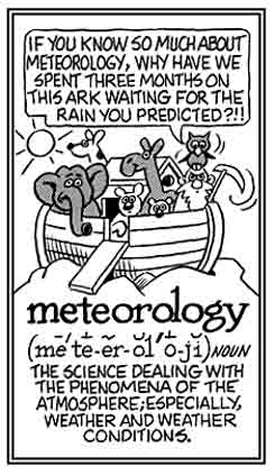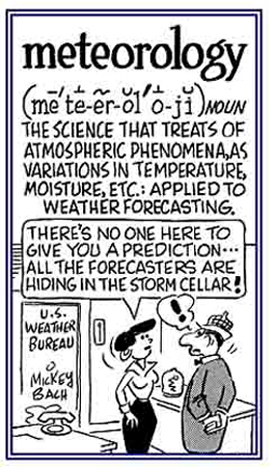meteoro-, meteor- +
(Greek: upraised, high up; in the air; anything raised from the ground, high, lofty; hovering in the air; hence, "heavenly body, atmospheric phenomenon")
meteorography
The descriptive science of meteors, or of meteorological phenomena.
meteoroid
1. A body moving through space, of the same nature as those which when passing through the atmosphere become visible as meteors.
2. One of the many small bodies in the solar system that become meteors on entering the earth’s atmosphere.
2. One of the many small bodies in the solar system that become meteors on entering the earth’s atmosphere.
meteorological
Pertaining to or connected with the science of meteorology. Also, pertaining to atmospheric phenomena.
Meteorologists are now concerned with problems; such as, acid rain caused by sulfur emissions from power plants, depletion of the ozone layer by fluorocarbon emissions, and global warming believed to be a result of increasing concentrations of carbon dioxide and other radiatively active trace gases.
Meteorologists no longer concern themselves solely with the atmosphere because the various aspects of global changes require that the atmosphere, the oceans, and the biosphere be treated as interacting parts of the climate system.
1. The study of, or the science of, the motions and phenomena of the atmosphere; especially, with a view to forecasting the weather: Before the last third of the 20th century, the term meteorology was used primarily in reference to the study of the winds, temperature, clouds, and other elements associated with weather.
2. Knowledge of the conditions of weather, atmospheric changes, etc., of a particular region: Meteorology is the scientific study of the physical and chemical phenomena of the atmosphere; especially, as they relate to weather and climate conditions.

© ALL rights are reserved.

© ALL rights are reserved.
Go to this Word A Day Revisited Index
2. Knowledge of the conditions of weather, atmospheric changes, etc., of a particular region: Meteorology is the scientific study of the physical and chemical phenomena of the atmosphere; especially, as they relate to weather and climate conditions.
Meteorology is now commonly used to include all of the scientific studies of the role of the atmosphere in the global climate systems.


Go to this Word A Day Revisited Index
so you can see more Mickey Bach illustrations.
meteorometer
An apparatus for receiving and transmitting records of atmospherical conditions and changes.
The pathology of conditions caused by weather or atmospheric circumstances: Some weather-sensitive people are very interested in meteoropathology and watch out for weather alerts of conditions that might affect their health in any way, for example by sudden and drastic changes in temperature.
A disease or illness caused by climatic conditions: The physical condition or symptoms of a person connected with weather changes, like extreme variations in temperature or humidity, is termed meteoropathy.
meteoroscope
1. An instrument for taking observations of heavenly bodies.
2. An instrument for measuring the apparent path of a meteor.
2. An instrument for measuring the apparent path of a meteor.
meteoroscopy
Observation of the stars.
meteorosensitive (adjective), more meteorosensitive, most meteorosensitive
Pertaining to something that is abnormally affected by weather conditions: The farmer's crops were very meteorosensitive to the conditions of drought that had been existing and he was afraid of going bankrupt.
meteorotropism, meteorotropic
The influence of meteorological events on biological conditions and events, such as death rate (e.g., sudden death), disease incidence (e.g., attacks of angina), joint pain, insomnia, traffic accidents, and birth rate.
paleometeorology
The study of atmospheric conditions at periods in the geological past.
telemeteorograph, telemeteorography, telemeteorographic
A meteorograph that records electrically at a distance; a combination of telethermograph, telebarograph, and teleanemograph.
Showing page 2 out of 2 pages of 29 main-word entries or main-word-entry groups.

